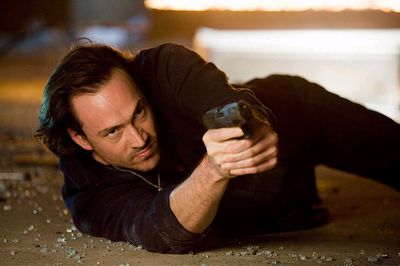Film studios embracing video games
Adaptations on big screen drawing show business superstars

Hollywood loves salable series, and as vital as “Harry Potter,” “Shrek” and “Transformers” might be to the bottom line, the studios are increasingly embracing an even more established and often better-selling franchise: the video game.
Today’s opening of “Street Fighter: The Legend of Chun-Li” is not apt to break any box-office records, largely because it’s premiering in limited national release on about 1,500 screens and likely will be eclipsed by “Jonas Brothers: The 3D Concert Experience.”
Yet the martial arts “Street Fighter” film does represent part of an aggressive return to video game adaptations, a genre that has gyrated in and out of popularity and suddenly is attracting several show business superstars.
Gore Verbinski, the director of the blockbuster “Pirates of the Caribbean” films, is developing an ambitious adaptation of the first-person shooter game “Bioshock,” while “Pirates of the Caribbean” producer Jerry Bruckheimer and filmmaker Mike Newell (“Harry Potter and the Goblet of Fire”) are deep into production on next year’s action-adventure release “Prince of Persia: The Sands of Time.”
Executives and filmmakers are drawn to the genre thanks in part to its built-in awareness, a critical advantage with so many movies competing for a shrinking moviegoing audience.
“Right now, you have to have an element that brands your pitch,” says Kevin Misher, a former Universal Studios production chief who, in addition to producing director Michael Mann’s July 1 mob drama, “Public Enemies,” is about to start pitching a planned movie version of a video game that he doesn’t want to identify publicly.
“It’s either a filmmaker, a piece of talent, a graphic novel or a video game – something tangible into which a studio can put its limited development dollars.”
Ashok Amritraj, whose Hyde Park Films co-financed “Street Fighter” with its video game maker, Japan’s Capcom Co., notes that “Street Fighter” is a “billion-dollar game franchise” that just celebrated its 20th anniversary with the release of a fourth edition of the game.
The game, launched in an arcade version in 1987, was previously made into 1994’s Jean-Claude Van Damme movie “Street Fighter,” which despite middling reviews grossed nearly $100 million worldwide.
“It certainly helps with the awareness for the film,” says Amritraj, whose 14-year-old daughter and 10-year-old son urged him to make the “Street Fighter” movie – which stars Kristin Kreuk, Chris Klein and Neal McDonough – because they enjoy the underlying game so much.
“And there’s this underground world – all these Internet sites where kids go to talk about the game – that are just huge,” he says.
Even in an era where an international smash such as “The Dark Knight” can earn more than $1 billion in global ticket sales, the returns generated by a popular video game can be astonishing, particularly at a time when people are cutting back on their discretionary spending.
When the latest version of the violent “Grand Theft Auto” game hit stores last May, it sparked opening-week sales of $500 million – far more than any movie has grossed in its initial seven days of exhibition.
“Obviously, games have a brand – that’s part of what you pay for when you acquire the rights,” says Marco Weber, whose Senator Entertainment Inc. is set to begin production later this year on a movie based on “Clock Tower 3,” a thriller game about a young girl trying to survive in a world filled with spirits and evil servants.
“But with ‘Clock Tower’ what you also have, compared to a lot of the other video games, is a really psychological thriller – it’s not a violent zombie world, but a very scary story with real people,” Weber says. “And that means we were able to take the screenplay into a direction that’s more like ‘The Shining.’ ”
At the same time, the makers of video game adaptations must be careful not to exclude the casual fan. The risk: Moviegoers who aren’t hard-core gamers may be disinclined to see the movie if they feel it’s only for knowing insiders.
When Sony Pictures’ TriStar Pictures released the video game-inspired horror film “Silent Hill” in 2006, the marketing materials made scant mention of its source material, assuming devoted gaming fans already would know where the film originated.
“Silent Hill” ended up becoming a modest hit, with domestic grosses of nearly $47 million. But not all recent video games have done as well as it and “Resident Evil,” a franchise that’s about to see its fourth installment.
“Max Payne” barely grossed $40 million last year, and 2005’s “Doom” and 2001’s “Final Fantasy: The Spirits Within” fared even worse.